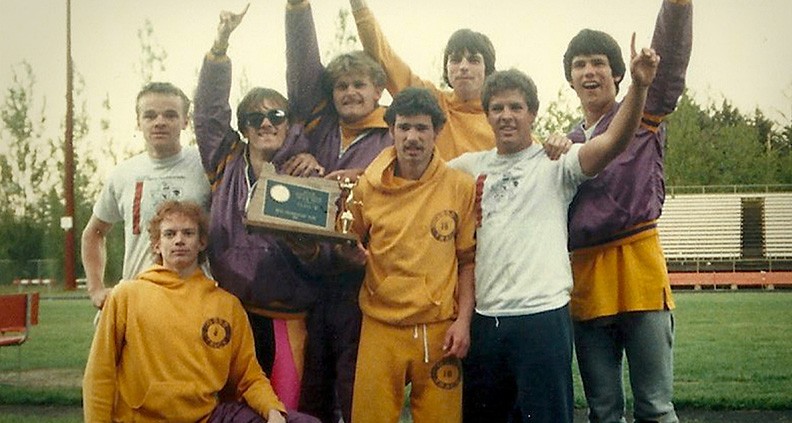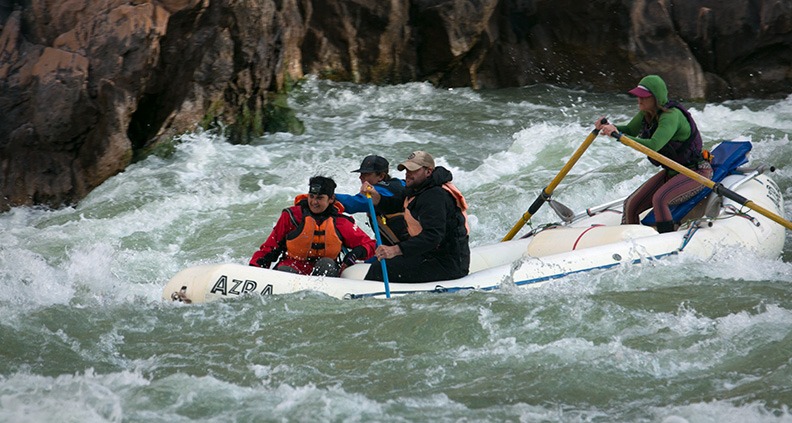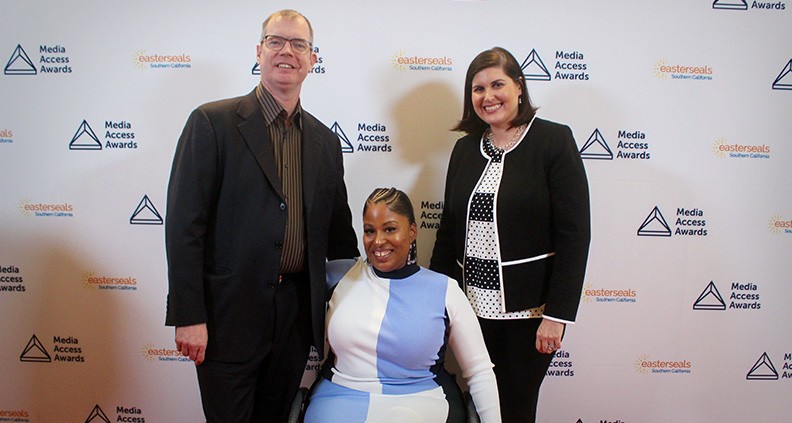Fiscal Spotlight: Two Awesome Titles Toppling the Stigma of Disability
Welcome to #FiscalSpotlight, a special monthly round up of projects—at all stages of production—working their way through Film Independent’s Fiscal Sponsorship pipeline.
***
Of the many groups and identities of which Hollywood has continually neglected, people with disabilities ranks among the most egregious. After all, we’re all due to be impacted by limited physical abilities at some point in our life, permanently or temporarily—either through sudden accident, degenerative medical condition, lifelong congenital trait or even just the natural process of aging. And if that fact fills you with some amount of dread, well… that’s part of the problem. A lack of education around disability—combined with the paucity normalizing via pop culture—has worked together to create needless stigma and discomfort.
In this month’s Fiscal Spotlight column, we’re taking a look at two very different projects centered on the experiences of the disabled: autobiographical documentary HIBM: Her Brave Inescapable Mission and underdog sports movie Flash Before the Bang. The former, about a UN worker’s remarkable feat of endurance in the face of a degenerative muscle disorder; the latter, inspired by the true story of the Oregon School for the Deaf’s championship 1986 Track & Field season—both projects supported through fiscal sponsorship.
We recently spoke to HIBM subject and executive producer Cara E. Yar Khan and Flash Before the Bang producer Delbert Whetter about their respective films, advocating for the disabled and their experiences with Film Independent’s Fiscal Sponsorship program.
CARA E. YAR KHAN & DELBERT WHETTER

Can you each please briefly describe your projects and what led you wanting to tell these respective stories?
Whetter: Flash Before the Bang is a narrative feature based on the true story of an all-deaf high school track and field team at the Oregon School for the Deaf that overcame adversity and overwhelming odds to seize victory at the Oregon State Track & Field Championship in 1986. The screenplay was written by my brother and producing partner Jevon Whetter, who also happens to be deaf. We come from a family that has three generations of hereditary deafness. We see this film as an opportunity to give audiences a rare look into deaf culture and the experiences of deaf people from a period that predates the Americans with Disabilities Act. It’s a coming-of-age drama set against the backdrop of an inspirational underdog sports story told with a unique perspective, from a community that has lacked a voice in Hollywood.
Khan: HIBM: Her Inescapable Brave Mission is a feature documentary following me—supported by my husband—on a daring 12-day expedition through Grand Canyon. It tells a story of humanity at its best, and of living bravely in the face of adversity. At age 30, in the early prime of my career with the United Nations, I was diagnosed with a rare muscle wasting disease that leads to quadriplegia called Hereditary Inclusion Body Myopathy (HIBM). Crossing the Grand Canyon from rim-to-rim on a wild Mustang was just another adventure I dreamed of. I knew I couldn’t hike with my weakening body, so I learned to ride a horse. But we really had no idea how dangerous or difficult it was going to be. I had no idea what I was getting myself into.
Why is it important that there be better representations of people with disabilities onscreen?
Khan: Better representation of people with disabilities is a smart business decision, moral obligation, wonderful addition of talent and creativity. It’s one of the most intriguing and compelling stages of life that affects all human beings for some period of time, at some point or another. People with disabilities are the largest minority group in the world. In America alone, we account for one in five people. There are another 105 million people who are our caregivers and immediate relatives. Together our community accounts for more than a third of the American population. Not being represented on screen is not only unfair; it’s a huge lost opportunity. People with disabilities are consumers too.
Whetter: One in five people have a disability, yet we’re virtually invisible in cinema, television and throughout Hollywood. It’s important to remember that disability can impact anyone, any race, gender, faith, orientation or background, at any time, whether due to aging, illness, accident or otherwise. This is such a massive slice of everyday American life that we’re missing out on—missed opportunities for stories, characters, creative talent and, more importantly for those number crunchers out there, the $1 billion disability market.

What kind of work are you doing to address these issues in Hollywood and your communities?
Whetter: I serve on the board of RespectAbility, a national nonprofit organization that works to fight stigma and advance opportunities for people with disabilities. A significant part of their work takes place within Hollywood to encourage representation, inclusion and authentic portrayals of people with disabilities both in front of and behind the camera. Earlier this year, we released The Hollywood Disability Inclusion Toolkit for creators in our industry to provide a roadmap on hiring and portraying people with disabilities in their work.
Khan: Now that I’ve settled in the US and left the world of international humanitarian aid, I devote myself as a full-time disability rights advocate. Through engagement with the private sector, on social media and in the community, on a daily basis I’m trying to help people identify their unconscious biases that exclude all minorities, teaching them how to make conscious decisions to include people with disabilities. I shine a spotlight on the issues facing this shunned community, which transcend every ethnicity, race, sexual orientation, gender and socio-economic standing, in a way that people not only change their attitudes, but also their behavior.
What sort of support, input or feedback have you received from your respective communities regarding your films?
Khan: As a disability rights advocates, I’m always careful that audiences don’t see people with disabilities living our everyday lives as “inspirational porn”—a festering plague that tells us that too many people still see us as objects of charity, less-than or needing to be cheered on like insecure children. My peers with disabilities and others with HIBM are excited about the release of the film. Interestingly, it was my peers without disabilities that were the most shocked that I actually pulled the expedition off at all. “Wow, you really did it!” they said, to which I respond: “Well of course. I said I would, so I did.” It’s disappointing how many people give me a pass to “check out” of everything or don’t expect me to succeed, just because I live with this progressive disease.
Whetter: We’ve received enthusiastic support from the Oregon School for the Deaf—the setting where our story takes place—as well as across the nation from the deaf community, including letters of encouragement from statewide deaf organizations and its leaders and the renowned Deaf West Theatre, among others. Our community views this film as an important opportunity to share our stories, demonstrate our talents and spread greater awareness of people with disabilities as valuable contributors to our society and culture.

As you see it, what is the best-case scenario for your film?
Whetter: The greatest obstacle for people with disabilities is usually not the disability itself—most often, the obstacle is other people’s perception of our disability. We want to combat this stigma through stories that portray ourselves as multi-dimensional beings that are fighters, heroes and champions, rather than as victims or people needing to be fixed or rescued. This would go a long way toward dismantling stereotypes, misconceptions, and preconceived notions about who we really are and what we can do.
Khan: I’d love to see out film reach audiences in at least 100 countries with a dynamite social impact campaign funded by a corporate brand committed to shattering stigma and promoting opportunities for full inclusion in society. Making money has never been an incentive of this film, but if we did we would have resources to create more educational opportunities related to the film. My dream is to harness the power of our footage into a multimedia presentation, and tour the world speaking on the valuable social and economic impact—not to mention moral obligation—of including of people with disabilities, while also motivating everyone to live bravely in the face of adversity. Disability affects us all at some stage in our lives.
Can you describe your experience with Fiscal Sponsorship?
Khan: When my husband and I received the news that Film Independent chose our project for the Fiscal Sponsorship program, we busted out into MC Hammer’s “2 Legit 2 Quit”. What a joyful boost of confidence it gave us—not to mention stamp of legitimacy for our donors as we were collecting funds for the production, which in a place like Grand Canyon is not cheap. We’ve been graced with introductions to mentors, such as Wendy Cohen from Picture Motion, and other industry expert forums. Being in Atlanta is a little isolating, but we hope to make it out West one day and meet everyone who has helped us in person.
Whetter: The Fiscal Sponsorship program has been a remarkable experience. As someone that has been involved in financing films previously in my career, I’m keenly aware of how rare it is for members from a disadvantaged community to be able to contribute their support to a movie that has a story that they really care about. The fiscal sponsorship program opens the door for people from marginalized and underrepresented communities to express their support via donations—through a filmmaker-friendly platform—that is accessible for all. It also brings funding opportunities from grants and philanthropic programs within reach that would not be available otherwise.
To learn more about HIBM: Her Inescapable Brave Mission—including how to support the project—click here. To learn more about Flash Before the Bang—including how to support—click here. To learn more about how Film Independent’s Fiscal Sponsorship programs works, check out our video primer below:
Learn more about Fiscal Sponsorship, including its benefits and eligibility requirements by visiting our website. See which projects are currently being supported via our Sponsored Projects page.
To learn how to become a Member of Film Independent, just click here. Be sure to follow us on Facebook, Twitter, Instagram and YouTube.
(Header: HIBM: Her Inescapable Brave Mission)